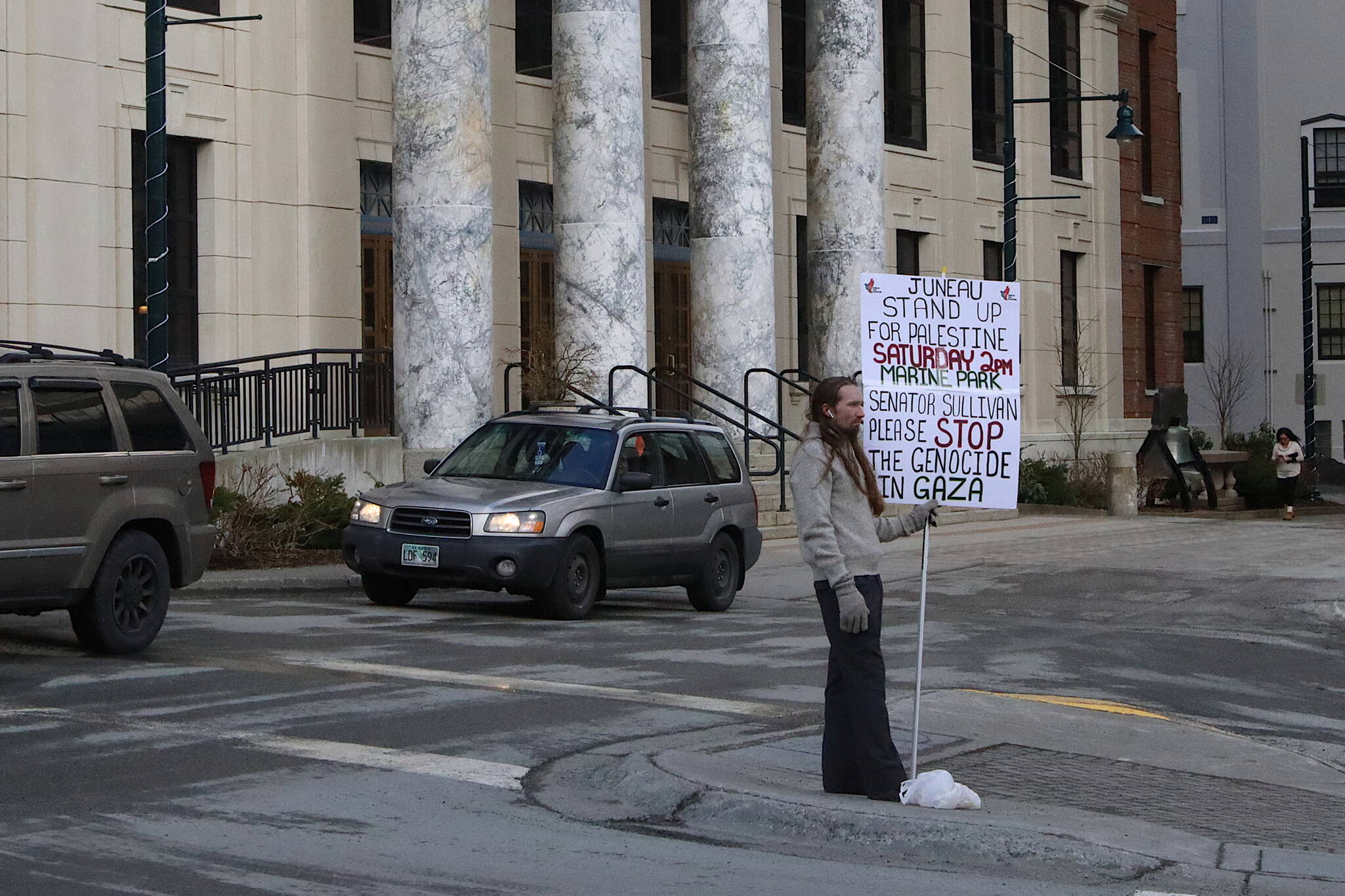Expanding activities that qualify as illegal protests and increasing the punishment for them are in a bill introduced Wednesday by Gov. Mike Dunleavy that is similar to many so-called “anti-protest” bills introduced by leaders of both political parties across the United States.
Interfering with emergency response officials such as police or firefighters is among the points of emphasis in House Bill 386 (and its companion Senate Bill 255). The bill also enhances the ability of people to sue protesters and their supporters for civil damages.
“This legislation ensures that our public spaces remain safe and accessible for all Alaskans,” Dunleavy said in a prepared statement. “It is important to distinguish between peaceful expression of rights and actions that pose risks to public safety and emergency response efforts.
Dunleavy’s bill was introduced the same day Eric Bookless, a Juneau resident, was standing on a median next to the Alaska State Capitol holding up a sign calling for action toward a ceasefire in Gaza. It did not appear he would be in violation of the new provisions in the governor’s bill that generally refer to a “person (who) knowingly renders a public place impassable or passable only with unreasonable inconvenience or hazard.”
Bookless said he wasn’t familiar with specifics of current law regarding permitted demonstrations or Dunleavy’s bill, but did take care not to obviously impede vehicle and pedestrian traffic.
“I figured if I was doing something illegal that I was not supposed to be doing some officer of the law would confront me and let me know,” he said. “And then I would just basically abide by what they’re asking me to do.”
But Bookless said legislation to toughen restrictions on protests and demonstrations raises questions.
“It seems odd to introduce a bill to limit protests because I mean that’s our freedom of speech,” he said. “We have a limited ability to control our government besides protesting and voting. So it kind of limits our rights there.”
At the same time, “I understand maybe from a public safety standpoint where that would come from as far as traffic, especially with emergency vehicles,” Bookless said.
Dunleavy’s bill elevates some violations to a Class C felony, which can result in up to five years in prison. Among the activities qualifying the toughest penalties are obstructing highways and other transporation means such as runways, especially if there is “substantial risk of physical injury to another person; or (interfering) with a firefighting, medical, or other emergency.”
It also expands “civil liability for obstruction of free passage in public places,” allowing parties to sue for amounts ranging from “$10,000 to a person who suffers only nominal damages” to “$500,000 to a person who suffers death.”
Furthermore, the civil penalties apply to anyone who encourages of aids such protests as well as people who participate in them.
The American Civil Liberties Union of Alaska expressed concern about the bill in a statement to the Alaska Beacon.
“Given the Governor’s poor track record for upholding 1st Amendment rights for Alaskans, we are giving this bill a very close look,” ACLU of Alaska spokesperson Meghan Barker wrote in an email to the Beacon. “We want to ensure that this bill maintains the right of the people to peaceably assemble and ensure that it does not infringe on Alaskans’ other constitutionally-protected rights.”
Legislation restricting and/or increasing penalties for unauthorized demonstrations has been abundant in recent years, sparked by major events such as the death of George Floyd, the Jan. 6 attack on the U.S. Capitol after the 2020 election and the current situation in Gaza.
Some such bills sponsored by Republican lawmakers sought to grant immunity to drivers striking protesters in public streets. Among such legislation in recent days is a bill sponsored by Democrats in the New York State Assembly in response to pro-Palestinian protests that would blocking transportation arteries such as public roads an act of domestic terrorism.
Jessica Bowers, a spokesperson for Dunleavy, stated in an email Wednesday no specific incidents in Alaska were the motivation for the governor’s bill.
• Contact Mark Sabbatini at mark.sabbatini@juneauempire.com or (907) 957-2306.

